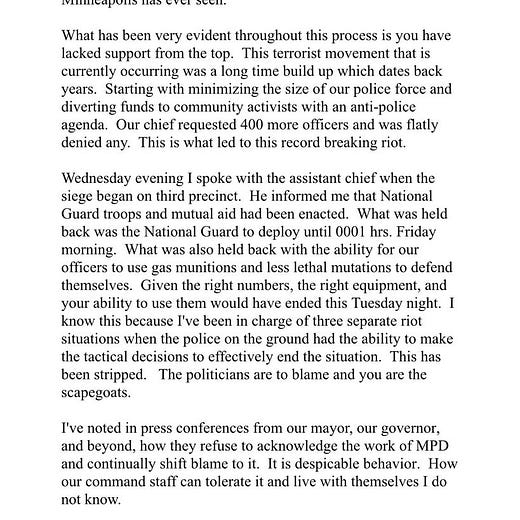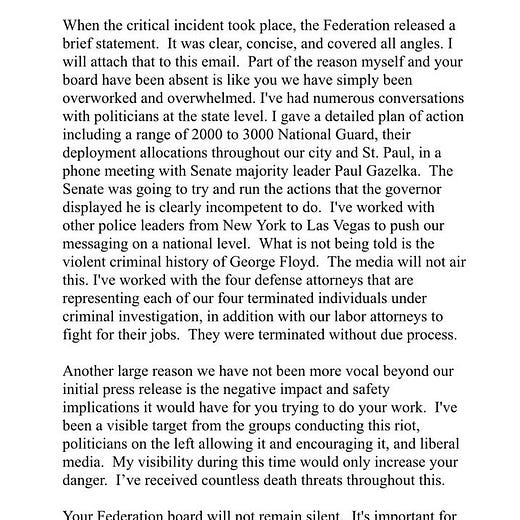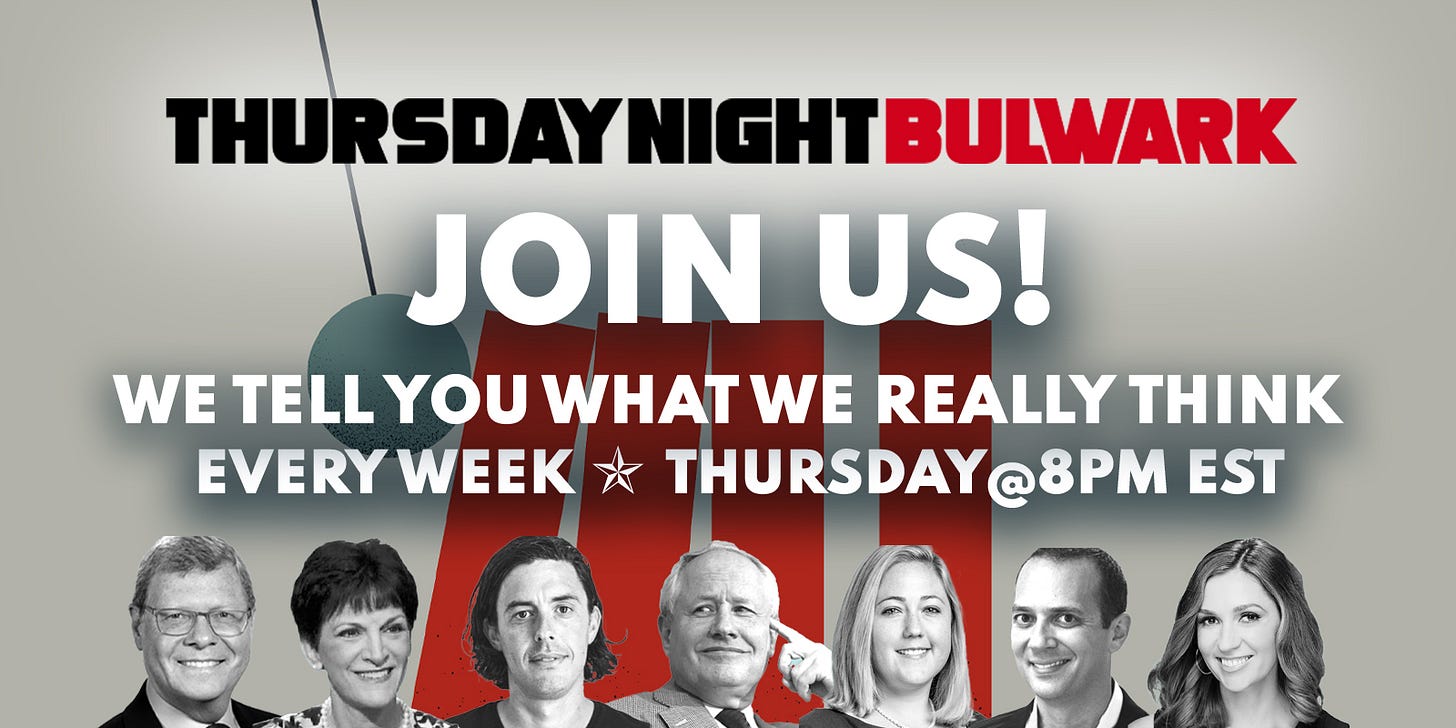The Chauvin Conviction Doesn't Fix Anything
Our law enforcement problems are varied and systemic.
1. Police Unions Are Bad
On May 25, 2020 Derek Chauvin woke up and went to work. He had no idea that a few hours later his life would change, forever.
But anyone who looked closely at Chauvin’s record would have known—should have known—that one day something bad was likely to happen while he was on the job.
Chauvin had 18 official complaints against him in his file—these are only the ones that citizens actually got up and followed through on registering. Two of these complaints earned him discipline from the department and letters of reprimand. He also had received two “medals of valor” from the department—each of these medals were linked to Chauvin having shot someone. (In one case, fatally.)
The complaints against Chauvin are heavily redacted and the only one we have details about is a 2007 incident. He pulled a woman over for speeding 10 mph above the posted limit. For some reason, he pulled her out of her car, frisked her, and then put her in the back of his cruiser. And—here is the key—his squad car camera was disabled for the entire incident.
This is a portrait of a bad cop. Not the worst cop to ever walk a beat, to be sure. But a guy without the intelligence, composure, or judgment to be given a badge, a gun, and the state-sanctioned ability to use deadly force.
And I suspect that his union went to bat for him every time. We can’t know that for sure, of course. But we do know that in the immediate aftermath of Floyd’s murder, the union sure as short went to bat for Chauvin:
That’s right: According to the union the protests were “a terrorist movement.” The politicians and the department leadership had “failed.” The governor was “incompetent.” And the union—the brave union—was trying to get the word out about George Floyd’s criminal history while “fighting” for the jobs of Derek Chauvin and his brother officers who were unconscionably “terminated without due process.”
Can you imagine what sort of person you have to be to hold such a funhouse view of the world?
Kroll eventually climbed down and went into damage control mode. But the point is this:
If you are a police officer who is bad at your job, your union isn’t doing you favors in the long term by preventing you from getting fired.
Because maybe you make it to your pension without getting convicted of murder. Or maybe you don’t.
As the philosopher Chris Rock puts it, police should be analogous to airline pilots.
Here is a question: If you were a pilot, and you were a very, very bad pilot who was a danger to yourself and others, would you want your union to prevent you from losing your job? Or would you rather be forced to do something else for a living—become a CPA, work in real estate, whatever?
Because maybe you don’t enjoy being a CPA as much as you like flying. But also: Being a CPA instead of a bad pilot will prevent you from killing yourself (and a plane full of people).
Police unions spend enormous sums of money defending their members from criminal complaints. They engage in brass-knuckled fights against management to keep members from being fired for poor performance. And the end result of this is that they help keep the barrel stocked with “bad apples.”
Maybe if the police union hadn’t gone to bat for Derek Chauvin, then George Floyd would be alive today. And Derek Chauvin wouldn’t be a cop, but he’d be a free man.
Trying to prevent a person who is bad at their job from the consequences of their failure doesn’t help anyone.
2. The System Is the Problem
It is nice that the justice system finally got Derek Chauvin’s badge taken away from him. It would have been nicer if this had happened without Floyd being killed and Chauvin being sent to jail.
But this single small “success” should not mask the fact that we have multiple systemic problems in criminal justice.
I’m not sure if you remember this, but the entire George Floyd case only became a national issue because bystanders took video. The police department’s initial account of what happened—based on the reporting from all four officers on scene—was this:
The corruption evidenced in that statement is staggering because it did not involve a split-second judgment call. No officer was being actively threatened. It is the product of multiple law enforcement officers telling premeditated lies and the department accepting them without question.
That culture doesn’t go away because Derek Chauvin is in jail.
We see these systemic problems in many cases of the police response to the George Floyd protests last summer.
We see the systemic problems with the killing of Adam Toledo which only came to light after a prosecutor lied about the events in court.
We see the systemic problems in how prosecutors continue to rely on the testimony of cops they know are dirty and hide this information from defendants in contravention of the law.
In the Mother Jones piece I linked to above there’s a legal form of corruption: The police unions and their associated organs give campaign donations to elected prosecutors.
Look: If an oil company gives money to a politician because it wants a certain policy passed, that’s corruption and it’s bad but whatever. It’s the corrupt act of a private actor.
If a union representing agents of the state gives money to a politician because it wants that politician to not prosecute rogue agents, that’s something very different. It’s basically the government bribing itself in an attempt to avoid accountability for what it does to the citizenry.
All of which is to say that problems we have with law enforcement in America don’t go away with Derek Chauvin.
The only way we solve them is with policy, legislation, and votes.
3. Soft Serve
This Wired story about the ice cream machines at McDonald’s is fantastic:
Of all the mysteries and injustices of the McDonald’s ice cream machine, the one that Jeremy O’Sullivan insists you understand first is its secret passcode.
Press the cone icon on the screen of the Taylor C602 digital ice cream machine, he explains, then tap the buttons that show a snowflake and a milkshake to set the digits on the screen to 5, then 2, then 3, then 1. After that precise series of no fewer than 16 button presses, a menu magically unlocks. Only with this cheat code can you access the machine’s vital signs: everything from the viscosity setting for its milk and sugar ingredients to the temperature of the glycol flowing through its heating element to the meanings of its many sphinxlike error messages.
“No one at McDonald’s or Taylor will explain why there’s a secret, undisclosed menu," O’Sullivan wrote in one of the first, cryptic text messages I received from him earlier this year.
As O’Sullivan says, this menu isn’t documented in any owner’s manual for the Taylor digital ice cream machines that are standard equipment in more than 13,000 McDonald’s restaurants across the US and tens of thousands more worldwide. And this opaque user-unfriendliness is far from the only problem with the machines, which have gained a reputation for being absurdly fickle and fragile. Thanks to a multitude of questionable engineering decisions, they’re so often out of order in McDonald’s restaurants around the world that they’ve become a full-blown social media meme. (Take a moment now to search Twitter for “broken McDonald’s ice cream machine” and witness thousands of voices crying out in despair.)
But after years of studying this complex machine and its many ways of failing, O’Sullivan remains most outraged at this notion: That the food-equipment giant Taylor sells the McFlurry-squirting devices to McDonald’s restaurant owners for about $18,000 each, and yet it keeps the machines’ inner workings secret from them. What's more, Taylor maintains a network of approved distributors that charge franchisees thousands of dollars a year for pricey maintenance contracts, with technicians on call to come and tap that secret passcode into the devices sitting on their counters.
The secret menu reveals a business model that goes beyond a right-to-repair issue, O’Sullivan argues. It represents, as he describes it, nothing short of a milkshake shakedown: Sell franchisees a complicated and fragile machine. Prevent them from figuring out why it constantly breaks. Take a cut of the distributors’ profit from the repairs.









